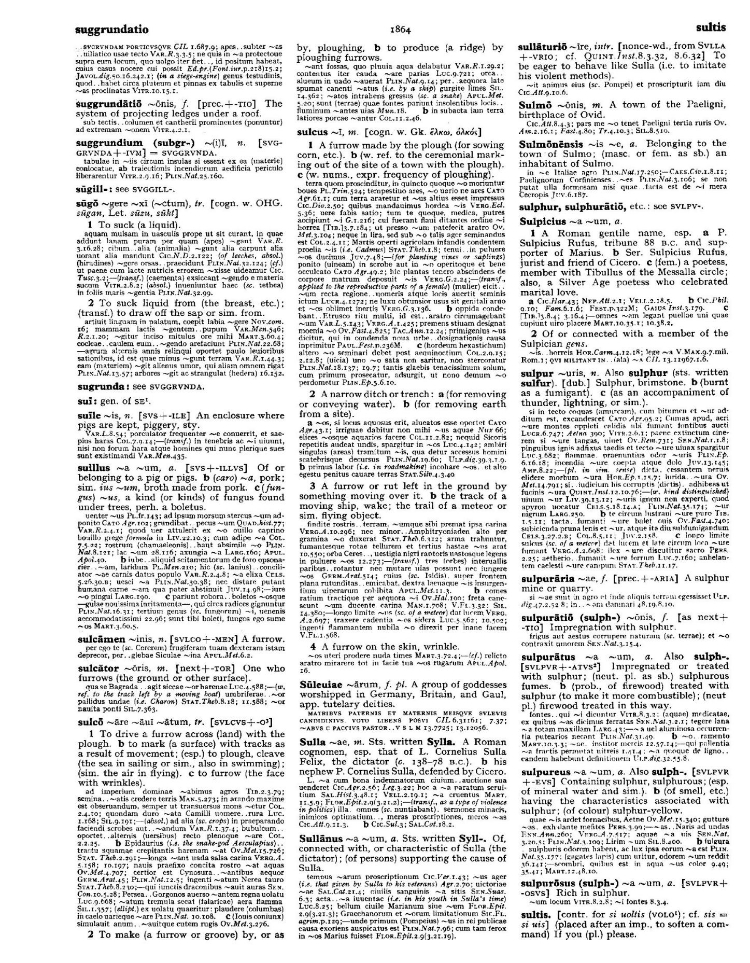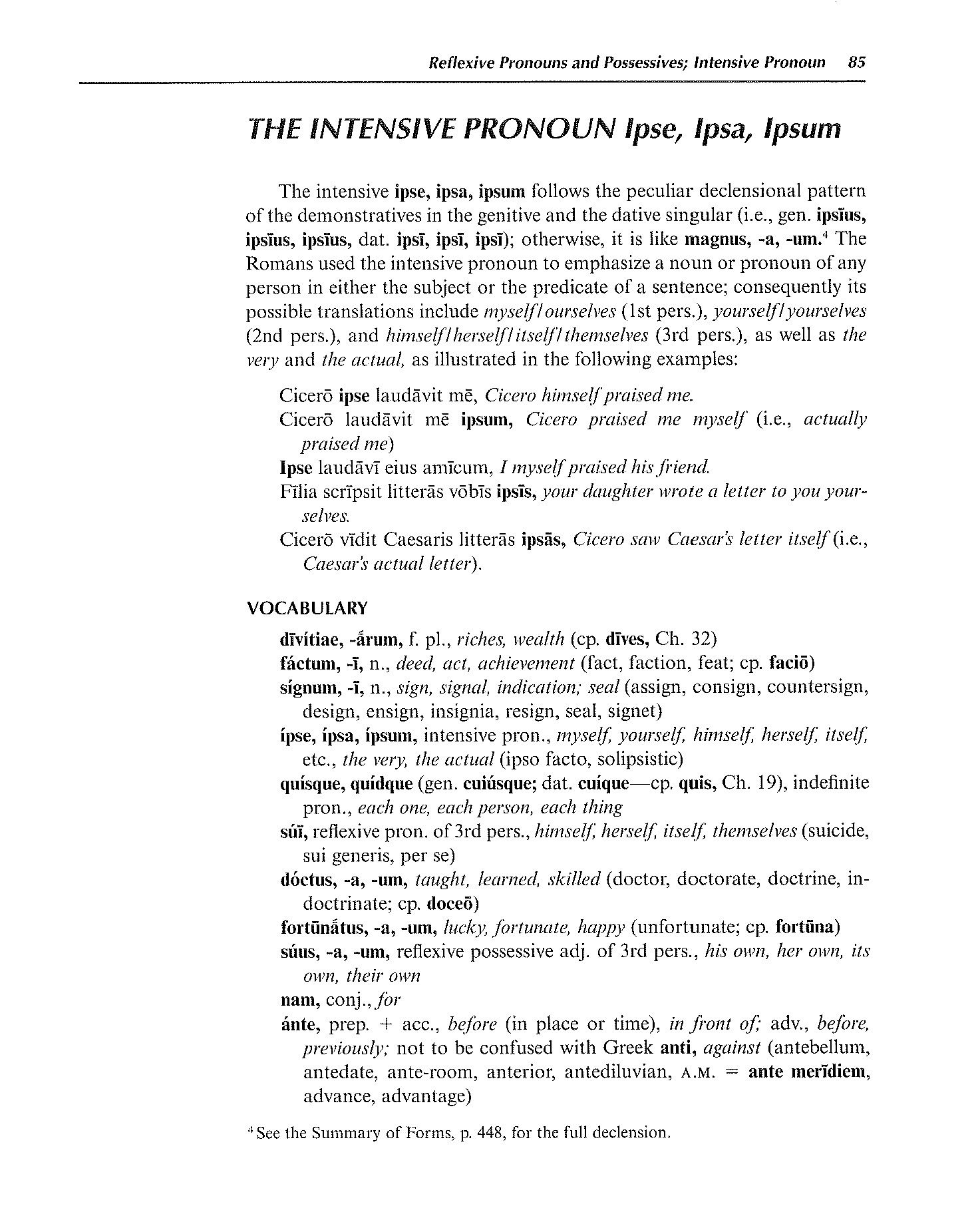
page_listing.tpl
page_subListingDetails.tpl
sub_listingDetails_style1.tpl
sub_listingDetails.title.tpl
suī themselves
suī is a Latin Pronoun that primarily means themselves.
Definitions for suī
Wheelock's Latin
Pronoun
- 1
himself, herself, itself, themselves
English derivatives:
suicide sui generis per se
Oxford Latin Dictionary
Pronoun
- 1
gen. of SE.
Sentences with suī
Latin to English
Omnēs virōs nostrōs laudāmus, quī virtūte et vēritāte moventur, nōn amōre suī.Compare We praise all our men, who are moved by courage and truth, not by love of themselves.
Rōmānī, quī decem rēs pūblicās Graecās exercitibus suīs cēperant, ipsī—mīrābile dictū—Graecīs artibus captī sunt!Compare The Romans, who had captured ten Greek republics with their own armies, were themselves—amazing to say—taken captive by the Greek arts!
Ille potens sui laetusque deget, cui licet in diem dixisse "vixi: cras vel atra nube polum pater occupato vel sole puro; non tamen irritum, quodcumque retro est, efficiet, neque diffinget infectumque reddet, quod fugies semel hora vixit."Compare He will through life be master of himself and a happy man who from day to day can have said, "I have lived: tomorrow the Sire may fill the sky with black clouds or with cloudless sunshine; he will not undo aught that is left behind me, nor change or make as though it had not been aught that the hour, fast as it flies, has once brought."
Paullatim assuefactus supero, ne sui quidem ipse cum Germani virtus comparo.Compare Having little by litle grown accustomed to be conquered, they do not even compare themselves with the Germans in valour.
Romulus Proculus dico sui deus sum, templumque sui dedico in is locus iubeo.Compare Romulus said to Proculus that he was a god, and commanded a temple to be dedicated to himself on that spot.
Habeo dux, memor vos, oblitus sui.Compare You have a leader, mindful of you, forgetful of himself.
Quid recuso possum, quin et socius sui consulo?Compare How can he refuse that the allies also should take care of themselves?
Si hilariter loquor, revoco sui rursus ad maestitia.Compare If they have spoken more cheerfully than usual, they recall themselves again to sorrow.
Data sources
Notes
- Definitions
- Frederick M. Wheelock, Wheelock's Latin, 6th ed., rev. Richard A. LaFleur (New York, NY: HarperCollins Publishers, 2005): 85.
- P. G. W. Glare, Oxford Latin Dictionary, Vols. 1-8 (Oxford: Clarendon Press, 1982): 1864.
- Word frequencies
- Christopher Francese, "Latin Core Vocabulary," Dickinson College Commentaries, last modified 2014, http://dcc.dickinson.edu.
- Paul B. Diederich, The Frequency of Latin Words and Their Endings, PhD diss., (Columbia University, 1939).
- Louis Delatte, Suzanne Govaerts, Joseph Denooz, and Etienne Evrard, Dictionnaire fréquentiel et index inverse de la langue latine [Frequency Dictionary and Inverse Index of the Latin Language] (Liège, Belgium: Laboratoire d'analyse statistique des langues anciennes de l'Université de Liège [L.A.S.L.A.], 1981): 119.
Bibliography
Allen, Joseph H. Allen and Greenough's New Latin Grammar for Schools and Colleges: Founded on Comparative Grammar. Edited by James B. Greenough, George L. Kittredge, Albert A. Howard, and Benjamin L. D'Ooge. Boston, MA: Ginn & Company, 1903.
Crystal, David. A Dictionary of Linguistics and Phonetics. 6th ed. Oxford, UK: Blackwell Publishing, 2008.
Delatte, Louis, Suzanne Govaerts, Joseph Denooz, and Etienne Evrard. Dictionnaire fréquentiel et index inverse de la langue latine [Frequency Dictionary and Inverse Index of the Latin Language]. Liège, Belgium: Laboratoire d'analyse statistique des langues anciennes de l'Université de Liège (L.A.S.L.A.), 1981.
Diederich, Paul B. The Frequency of Latin Words and Their Endings. PhD diss., Columbia University, 1939.
Francese, Christopher. "Latin Core Vocabulary." Dickinson College Commentaries. Last modified 2014. http://dcc.dickinson.edu/latin-vocabulary-list.
Gildersleeve, Basil L., and Gonzales Lodge. Gildersleeve's Latin Grammar: Third Edition, Revised, and Enlarged. 3rd ed. London, England: Macmillan and Co., 1903.
Glare, Peter G.W. Oxford Latin Dictionary. Vols. 1-8. Oxford, England: Clarendon Press, 1982.
Krüger, Bernd. "Latin Conjugation Tables." Cactus2000. Accessed May 5, 2023. https://latin.cactus2000.de/index.en.php.
Pierson, Nick. "Sound of Text." Accessed October 26, 2019. https://soundoftext.com.
Wheelock, Frederick M. Wheelock's Latin. 6th ed. Revised by Richard A. LaFleur. New York, NY: HarperCollins Publishers, 2005.
Wiktionary Contributors. "Victionarium." Wikimedia Foundation, Inc. Updated March 18, 2019. https://la.wiktionary.org/wiki/Victionarium:Pagina_prima.
Citation
Chicago (17th ed.)
Allo Contributors. "suī (pron.) - Latin Word Definition." Allo Latin Dictionary. Last modified . Accessed February 23, 2026. http://ancientlanguages.org/latin/dictionary/sui.
Entry created on . Last updated on .







